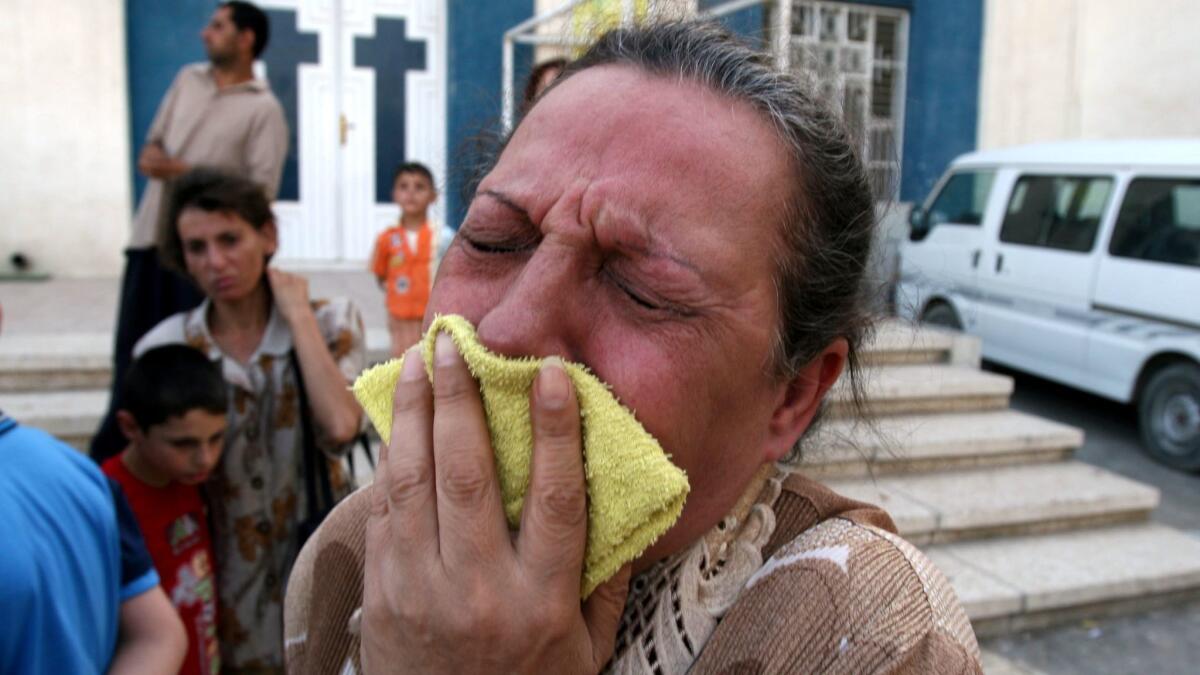Op-Ed: Trumpâs proposed refugee policy could cost American lives

On Sept. 13, 2007, President George W. Bush addressed the Iraqi people as he spoke about the nation the U.S. had invaded roughly four years earlier.
âTo the Iraqi people: You have voted for freedom, and now you are liberating your country from terrorists and death squads,â Bush said. âAs you do, have confidence that America does not abandon our friends, and we will not abandon you.â
Nearly a decade later, it looks like America is poised to do just that.
The Trump administration is considering proposals â a draft of which is circulating â that would ban for 30 days all entry to the United States from seven countries, including Iraq. It also would suspend the entry of all refugees for four months, including those from Iraq, where more than 4,000 U.S. service members are now deployed.
If this proposal becomes policy, all Iraqis, including those who have put their lives on the line for the U.S., would find the door shut in their face, regardless of their service.
What will the next Iraqi or Syrian interpreter say when his American colleagues ask him to risk his life?
Since the U.S. invasion of Iraq, Iraqis have fought next to and translated for American forces. They also have assisted the U.S. governmentâs diplomatic and civil society efforts, including at the U.S. Embassy in Baghdad. As a consequence of this service, some have found their lives endangered and their families threatened.
For some U.S. military veterans, the move to ban Iraqis is a betrayal of brothers-in-arms â one they take personally. And they say they fear the suspension could become permanent.
âIt breaks a promise that when we fought together, we would take care of each other,â says Chase Millsap, a veteran of three combat deployments to Iraq as a Marine, including one in which he worked with Army Special Forces. He served in both Anbar province and in Mosul, parts of which Iraqi forces with U.S. assistance have just liberated from Islamic State control. âIt is going to be a massive moral injury to a generation of veterans, myself included.â
In 2006, Millsapâs life was saved by an Iraqi army officer he calls âThe Captainâ for security reasons. For the last three years, Millsap has been working to bring The Captain to the United States. Millsap says his friend passed the United Nations refugee vetting process and completed the U.S. paperwork for refugee assistance, but may now face an indefinite hold.
The Captain wrote to Millsap this morning, asking what the possible executive order meant for his chances of coming to the United States. Millsap said he told The Captain, âWe are brothers but we need to start looking for other countries you would be willing to go to.â
Despite the scalding political rhetoric, the visa process for Iraqis who served with the U.S. military or government, as well as for ordinary refugees, is already extensive. It takes years and requires paperwork that includes, according to the Congressional Research Service, âpassport biodata pages, birth certificates, and civil documents; police certificates, if applicable,â along with â an in-person visa interview for the principal applicant and any family members at a U.S. embassy or consulate abroad.â Plus fingerprints, a medical exam, and multiple letters of recommendation and verification.
If anything, the existing system is potentially too slow, the Congressional Research Service has noted. Should the draft proposal takes effect, the U.S. will be saying to the world that it has no faith in its ability to distinguish between those who shed blood for it and those who pose a threat.
And in the process of enacting these measures, the United States, a nation at war that fails to act like it, stands to lose the goodwill and support of the very same people it needs to win the battles now underway against Islamic State. What will the next Iraqi or Syrian interpreter say when his American colleagues ask him to risk his life?
It is a question Millsap has already pondered.
âPeople will die, and I am concerned for the team guys [Special Forces] on the ground right now, because if you are working with an interpreter and they have no path for safety, that puts you at risk,â he says. âNow we are talking about American lives.â
And American values. Both hang in the balance.
Gayle Tzemach Lemmon is a senior fellow at the Council on Foreign Relations and the author of âAshleyâs War: The Untold Story of a Team of Women Soldiers on the Special Ops Battlefieldâ and âThe Dressmaker of Khair Khana.â
Follow the Opinion section on Twitter @latimesopinion or Facebook
More to Read
A cure for the common opinion
Get thought-provoking perspectives with our weekly newsletter.
You may occasionally receive promotional content from the Los Angeles Times.










